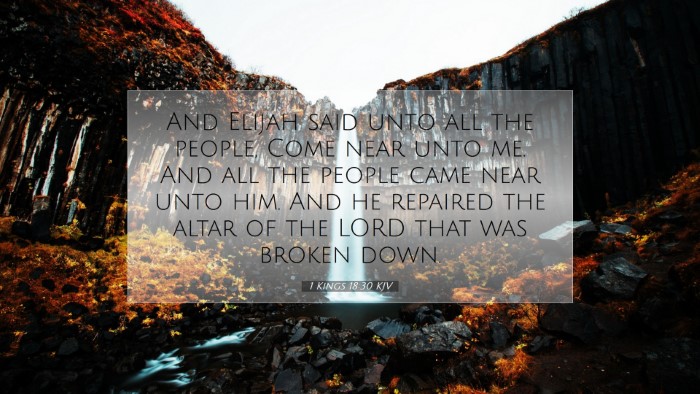Commentary on 1 Kings 18:30
Verse Context: 1 Kings 18:30 reads: "Then Elijah said to all the people, 'Come near to me.' And all the people came near to him. And he repaired the altar of the Lord that had been thrown down."
Introduction
This verse captures a pivotal moment in the confrontation between the prophet Elijah and the prophets of Baal on Mount Carmel. It serves as an essential point of reflection on worship, divinity, and the condition of God's covenant community. Understanding this passage requires a deep dive into the historical and theological implications presented in the narrative.
Significance of the Altar
The act of repairing the altar is loaded with meaning. As noted by Matthew Henry, the altar represents a place of worship and sacrifice. It symbolizes a return to proper devotion and the acknowledgment of God as the true deity. In a time where Baal worship had permeated Israel, God's people were called back to a pure expression of faith.
Albert Barnes emphasizes that the altar was not merely a physical structure; it represented Israel's covenant relationship with God. By repairing the altar, Elijah was making a profound statement about the restoration of true worship and the importance of the sacrificial system established by God.
Elijah's Call to the People
Elijah's invitation to the people to draw near signifies an important pastoral moment. As Adam Clarke points out, it illustrates the leader's role in guiding the people toward a renewed understanding of God. This gathering serves as a critical act of communal repentance and the pursuit of truth.
The gathering also serves to exclude any distraction from Baal worship, inviting the people to witness the demonstration of God’s power. The act of coming near indicates the desire for closeness to God and represents a collective turning away from false idols.
Theological Implications
Elijah’s actions were not just about restoring a physical structure but were emblematic of restoring a spiritual condition. The repair of the altar signals a turning point for the nation of Israel. Matthew Henry illustrates that the restoration of the altar was integral to renewing covenant faithfulness. It symbolizes returning to the foundational aspects of faith and worship.
Albert Barnes observes that religious rituals, like altar construction, often carry both historical and theological significance. It illustrates the history of God’s interaction with Israel, inviting the current generation to remember their roots and align with God’s purposes. Proper worship signifies a commitment to faithfulness amidst surrounding pagan practices.
The Cultural Context
During Elijah’s time, Israel was plagued by idolatry and influenced by surrounding nations that worshiped Baal. The prophets of Baal represented a significant pressure against the worship of Yahweh. The act of repairing the altar thus stands as a rebellion against the idolatry of the age. Adam Clarke notes that this historical context amplifies Elijah's position as a prophet who calls the people back to their covenantal roots.
The communal gathering, as initiated by Elijah, can be viewed as an act of resistance against cultural norms of the time. The significance of the altar was further multiplied by its role in Israel's history, representing a sacred space where divine encounters occurred.
Spiritual Applications
The process of repairing the altar invites significant reflection for contemporary readers, especially for pastors and theologians. The invitation to "come near" emphasizes the need for introspection and communal repentance. Matthew Henry challenges modern believers to consider what altars need repair in their own lives and communities, urging a rejection of spiritual complacency.
Albert Barnes suggests that believers ought to examine their relationship with God and identify practices that may detract from their devotion. In a culture full of distractions, the call to restore our altars and cultivate genuine worship becomes essential.
Adam Clarke offers insight into the collective nature of worship. The gathered community reflects a unified front in seeking God’s presence, paralleling the communal call for repentance today. The act of gathering serves as a reminder that faith is both personal and communal.
Conclusion
1 Kings 18:30 embodies a vital moment of reckoning for Israel, represented through the repair of the altar. It serves as a powerful metaphor for revitalizing a broken spiritual relationship with God. As we reflect on this verse, it is imperative for modern believers to consider how they can engage in the act of repair in their own spiritual lives. The invitation to draw near stands as a timeless call for revival and restoration, challenging us to prioritize our relationship with God amidst the distractions of our era.


